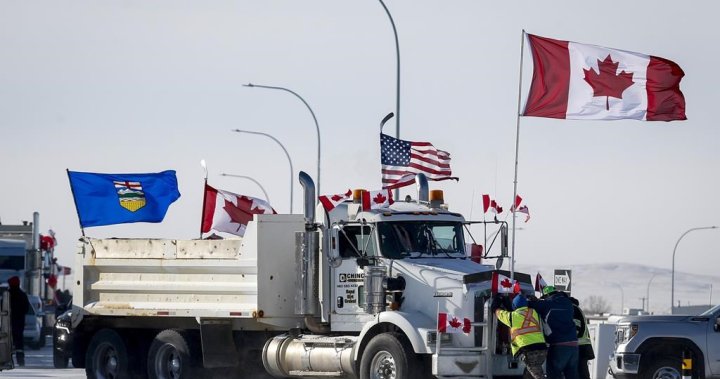Three men are on trial for their roles in a border blockade at Coutts, Alberta, which took place in early 2022 to protest COVID-19 pandemic rules and restrictions. The men, Alex Van Herk, Marco Van Huigenbos, and Gerhard Janzen, have pleaded not guilty to a charge of mischief over $5,000. The Crown prosecutors claim that the trio spearheaded the protest that tied up traffic at the Canada-United States border crossing for two weeks. RCMP Sgt. Greg Tulloch testified that Van Huigenbos was the main contact person for the protesters, but a lawyer for Van Huigenbos argued that his client was merely a messenger and not a leader. The lawyer, Ryan Durran, suggested that Van Huigenbos was a communicator and spokesperson, rather than an instigator of the protest.
Durran emphasized that Van Huigenbos was not considered an agitator and did not have a semi-trailer truck parked at the protest site. He mentioned that Van Huigenbos and others wanted to move the protest from Coutts to Edmonton, but the attempt failed. However, Tulloch maintained that he considered Van Huigenbos to be at the top of the inner circle of the protest, indicating that he was a leader. Tulloch stated that Van Huigenbos had the ability to make things happen and make decisions. He believed that finding a leader was the best way to communicate with the protesters and make progress in resolving the situation.
The prosecution witnesses, including RCMP Supt. Gordon Corbett, described the events at Coutts during the protest. Corbett mentioned that the initial plan was to tow the protest vehicles, but police were unable to obtain enough trucks to carry out the plan. The tone of the protest began to change in the second week, with an increase in public safety risks. Corbett stated that there were threats to public safety and police due to the presence of firearms at the site, although these weapons were not directly linked to the three accused. He became emotional when discussing instances where large vehicles were driven towards police officers, leading to an escalation of activity at the protest site.
Corbett highlighted the incidents where a tractor advanced towards a police officer and where a farm tractor and a semi-truck attempted to ram a police vehicle. These events raised concerns about the safety of the officers and the need for the protest to be resolved. The protesters eventually left two days later after RCMP seized a cache of weapons and made several arrests. Throughout the trial, the defense has argued that the accused men were not leaders of the protest but rather messengers or communicators. The Crown prosecutors, on the other hand, have presented evidence suggesting that the trio played significant roles in organizing and leading the border blockade.
The ongoing trial has shed light on the complexities of the protest at Coutts and the different perspectives regarding the roles of the accused men. While the defense maintains that their clients were not instigators of the protest but rather messengers communicating the group’s intentions, the prosecution believes that the trio were leaders who spearheaded the blockade. The testimonies of RCMP officers and witnesses have provided insight into the escalating tensions and the risks posed by the protest, ultimately leading to the decision to take action against the protesters. The trial continues as both sides present their arguments and evidence to the jury in order to determine the guilt or innocence of the accused men in relation to the border blockade at Coutts in early 2022.


